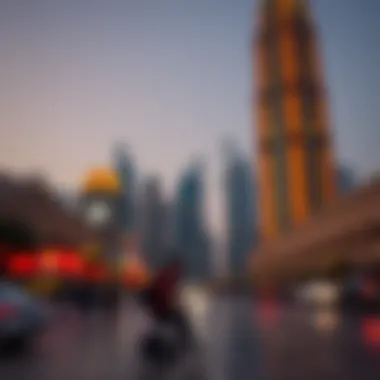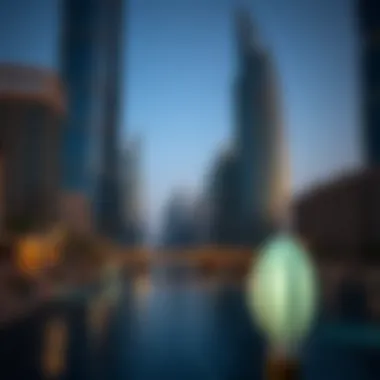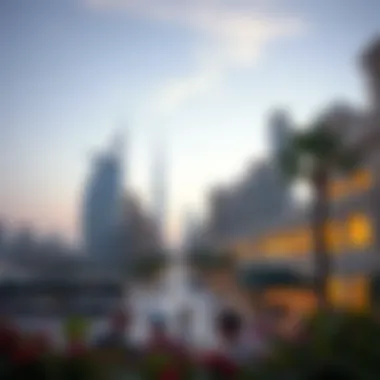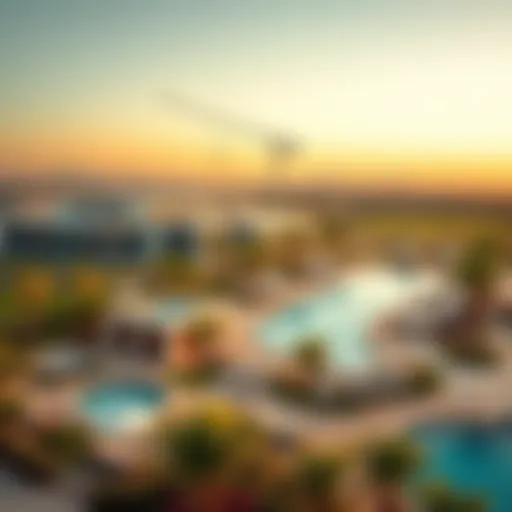Exploring Dubai: The Allure of a Global Destination


Intro
Dubai, a dazzling gem in the heart of the United Arab Emirates, stands out as one of the most visited cities on the planet. With its breathtaking skyline, remarkable luxury, and a cosmopolitan lifestyle, it draws millions of tourists each year. Yet, beyond its glitzy exterior lies a city bustling with an intricate blend of tradition and modernity, making it a beacon for travelers and investors alike.
As we navigate through the layers of Dubai’s appeal, the following sections will unravel the key elements that contribute to its global allure. From the iconic Burj Khalifa to the cultural richness found in the Al Fahidi Historical Neighborhood, each aspect tells a story that enhances the desire to explore and invest. Moreover, the implications of these attractions play a pivotal role in shaping the real estate landscape, creating diverse opportunities for homebuyers and investors.
Understanding Dubai is like peeling an onion; each layer reveals something unique that begs to be experienced. Let’s embark on this exploration that melds luxurious escapism with practical investment insights.
Intro to Dubai's Global Appeal
Dubai has firmly established itself as a global hub attracting tourists from all corners of the earth. Known for its extravagant lifestyle, stunning architecture, and diverse cultural landscape, the city offers more than just luxury. It serves as a gateway to understanding modern Arab culture, poised between tradition and innovation. This article aims to explore the elements that contribute to Dubai's attraction and assess their impact on various stakeholders, particularly investors and homebuyers.
One key aspect of Dubai’s appeal is its remarkable transformation over the past few decades, shifting from a modest fishing village into a bustling metropolis. Tourist influx has dramatically increased, thanks to strategic initiatives that enhanced its global standing. As such, understanding not only attracts visitors but also sets the stage for substantial real estate developments. Key decision-makers in this field can benefit from insights herein that capture the essence of this vibrant city.
Brief History of Dubai's Transformation
The journey of Dubai is nothing short of extraordinary. In the early 20th century, it was a small trading post focused on pearl diving. However, by the mid-20th century, significant oil discoveries changed its trajectory. By the 1970s, the government placed an emphasis on diversifying its economy. The Vision 2021 initiative, launched in 2010, set ambitious goals to position Dubai as a world leader in tourism, trade, and innovation. Today, Dubai stands as a testament to what investment, strategic planning, and a bold vision can achieve.
Dubai has invested heavily in both infrastructure and tourism, creating attractions that are now world-renowned. The Burj Khalifa, for instance, redefined the skyline and became an emblematic landmark. More entertainingly, the launch of extravagant projects like the Palm Jumeirah and The Dubai Mall showcases the city’s penchant for outdoing itself.
As such, the transformation offers not only a feast for the eyes but also numerous real estate investment prospects, appealing to international investors eager to capitalize on Dubai's growth trajectory.
Understanding the Tourist Influx
The influx of tourists into Dubai is not merely a consequence of stunning visuals but a result of well-crafted strategies targeting diverse demographics. Statistics from the Department of Tourism and Commerce Marketing show that pre-pandemic, the city drew over 16 million visitors annually, and this number is on the upswing once again.
Factors contributing to this surging tide of tourists include:
- Strategic Location: Geographically located between East and West, Dubai acts as a pivotal connection for travelers.
- Cultural Diversity: Visitors are often enchanted by Dubai's blend of cultures, offering both traditional and contemporary experiences.
- World-Class Events: From the Dubai Shopping Festival to Art Dubai, the city hosts events that draw in international crowds, cementing its place on the global map.
- Year-Round Sunshine: The warm and inviting climate, especially during the winter months, is a significant draw for many seeking to escape colder climates.
"Tourism in Dubai is not just about leisure; it's a complex ecosystem contributing to the economy and community while enriching the visitor experience."
While tourists enjoy various offerings, real estate investments continue to flourish as property developers aim to meet this growing demand. Investors see that increased foot traffic brings opportunities for rental income and tourism-related ventures, making Dubai a hotbed for real estate endeavors.
In summary, Dubai’s global appeal lies in a fascinating tapestry woven from its rich historical transformation and current strategic moves to welcome millions of tourists. Understanding these aspects provides a comprehensive backdrop for assessing the city's impact on diverse sectors, not least of which is real estate. Through this exploration, stakeholders can glean insights to navigate the opportunities and complexities found within this vibrant locale.
Key Attractions Drawing Global Visitors
Dubai's landscape is a tapestry woven with threads of opulence, culture, and exhilarating experiences. The key attractions here not only represent leisure and entertainment but also reflect the city's rapid growth and global status. Every corner of Dubai seems to hold a promise of wonder, making it a hotspot for travelers. Understanding these attractions is vital, as they serve as both a draw for tourists and a foundation for real estate investments. The combination of unique experiences and state-of-the-art developments enhances the overall appeal, which benefits homebuyers and investors alike.
Iconic Landmarks: Burj Khalifa and Beyond
When discussing Dubai, one can't overlook the towering Burj Khalifa. Standing at 828 meters, this architectural marvel isn't just a skyscraper; it's a beacon of modernity and engineering prowess. Visitors flock here not just for the stunning views that stretch across the desert to the sea, but also for the immersive experience that the tower offers. The observation deck, located on the 148th floor, often leaves visitors in awe. While the Burj Khalifa is the crown jewel, other landmarks like the Burj Al Arab and the Palm Jumeirah also command attention. These sites tell a story of ambition and creativity, making them alluring to tourists seeking a taste of luxury.
Beyond the glitz, the Dubai Frame stands as a unique structure linking the city's historical past with its futuristic outlook. The Dubai Marina and the Dubai Mall, next to the Burj Khalifa, enhance the tourist experience with their dynamic environments, hosting a myriad of attractions from shops to entertainment venues.
Cultural Experiences: Museums and Heritage Sites
Dubai stands as a melting pot of cultures, and its cultural attractions reflect this diversity. The Dubai Museum, located in the Al Fahidi Fort, presents a glimpse into the emirate's past, showcasing the evolution from a small fishing village to a global hub. This juxtaposition of history with modernity underlines Dubai’s narrative—a vital aspect for understanding its appeal.
Another significant site is the Sheikh Mohammed Centre for Cultural Understanding, which encourages locals and visitors to engage in dialogue, fostering intercultural relations. Events such as the Dubai Art Season spotlight the city's commitment to art and heritage, resonating with those seeking a deeper connection with local culture. For potential investors, these cultural experiences boost the overall attractiveness of the city, increasing property values as demand for accommodation in culturally rich areas rises.
Shopping Destinations: Malls and Souks
Dubai is synonymous with shopping, which adds another layer to its allure. The Dubai Mall is not just a shopping center; it’s an experience in itself, featuring over 1,200 retail shops, an ice rink, and even an indoor aquarium. Shoppers can take a breather by the spectacular fountain shows that dance to music and light, adding to the overall magical atmosphere.
In contrast, traditional souks such as the Gold Souk and Spice Souk offer a different flavor altogether. Here, curiosity leads people to explore and haggle for culturally-rich items, attracting not just shoppers, but also those interested in immersive experiences that tell a story of tradition. The blend of high-end brands with authentic market experiences can sway buyers—both for goods and for property near these vibrant centers.


Entertainment Options: Theme Parks and Events
When the sun sets in Dubai, the fun is just getting started. The city boasts an impressive array of theme parks including IMG Worlds of Adventure and Dubai Parks and Resorts. These parks offer exhilarating experiences that cater to all age groups. From high-thrill rides to family-friendly attractions, entertainment reaches every corner of the city.
Additionally, events like the Dubai Shopping Festival and the Comedy Festival attract thousands, maximizing the potential for visitors to experience the city's vibrant lifestyle. Such events significantly boost hospitality and retail sectors, helping to sustain the economy and keep Dubai bustling. For homebuyers looking for trendsetting spots, residing in vibrant neighborhoods near these attractions could not only enhance their lifestyle but also their investment potential.
"Dubai's attractions are not mere sights; they are gateways into a world where possibilities are as vast as the desert itself."
In summary, the attractions in Dubai extend beyond mere sightseeing. They embody a lifestyle, an opportunity, and a canvas where both local and international communities come together. This remarkable mix continues to make Dubai not just a tourist hotspot, but also a goldmine for real estate investments.
The Role of Hospitality in Dubai's Tourism
Given Dubai’s reputation as a premier tourist destination, the hospitality sector is fundamental to its appeal. It’s not just about providing a bed to sleep in; it’s about delivering an experience that leaves a lasting impression. For visitors, this often shapes their overall perception of the city. Whether one is lounging in opulent surroundings or enjoying a cozy budget accommodation, the hospitality element enhances the allure of the location. It contributes significantly to the tourists’ satisfaction, fostering repeat visits and recommendations, which subsequently raises the city's profile globally.
Luxury Hotels and Resorts
Dubai has an extensive array of luxury hotels and resorts, including the renowned Burj Al Arab and the majestic Atlantis The Palm. These establishments often feature distinctive architectural styles, catering to those seeking premium experiences. The service is generally top-notch, with impeccable attention to detail.
Key Features of Luxury Accommodation:
- Unparalleled Amenities: Most high-end hotels offer a range of lavish amenities—think infinity pools overlooking vast skylines or exclusive private beaches.
- Fine Dining Experiences: Michelin-starred restaurants abound, attracting well-heeled foodies eager to sample culinary masterpieces created by world-class chefs.
- Wellness and Spa Services: Many luxurious resorts feature spas renowned for their holistic treatments and well-being programs that promise relaxation and rejuvenation.
"Luxury in Dubai isn’t just about the room; it’s the entire experience that captures the visitor’s heart and mind."
Furthermore, many luxury hotels curate personalized experiences for their guests. Whether it’s a private yacht tour in the Arabian Gulf or a bespoke desert safari package, these offerings can elevate a visitor’s stay into something truly memorable.
Affordable Accommodation Choices
Contrasting the luxury sector, Dubai also presents a variety of more budget-friendly options for travelers. This demand for affordable accommodation speaks to a larger audience, ranging from young backpackers to families on holiday. Options might include hostels, budget hotels, and short-term rentals, which are increasingly popular among visitors seeking more intimate experiences.
- Diverse Location Choices: Visitors can find affordable options nestled in older parts of the city, such as Deira, as well as modern areas like Dubai Marina.
- Practical Amenities: Many budget hotels still offer essential comforts—Wi-Fi, air conditioning, and even complimentary breakfast—allowing guests to enjoy their stay without breaking the bank.
Interestingly, some travelers prefer these budget accommodations as they allow for a deeper dive into local life, fostering interactions with Dubai’s diverse population. This can be refreshing and provide a unique perspective, making a trip feel more authentic.
In summary, the role of hospitality in Dubai’s tourism is multifaceted. It not only provides luxurious offerings for affluent tourists but also ensures that those on a tighter budget can enjoy what the city has to offer. This balance caters to a wider audience and enhances the overall appeal of this vibrant destination.
For more information on hospitality in Dubai visit resources like Wikipedia and Britannica.
Culinary Landscape: A Gastronomic Journey
The culinary scene in Dubai is a vivid tapestry woven from the diverse cultures that have converged in the region. This aspect is pivotal, not merely as a channel of tourism but also as a reflection of Dubai’s dynamic societal fabric. Visitors often find that food is not just sustenance; it’s an experience, an integral part of the local culture and heritage.
One cannot understate how pivotal the culinary landscape is in attracting global tourists who are keen to explore flavors beyond the ordinary. From extravagant fine dining to humble street stalls, Dubai caters to every palate. This journey into the world of food reveals not just tastes, but stories steeped in history, migration, and innovation that shape the very essence of Dubai as a must-visit destination.
Dining Options: Fine Dine vs Casual Eats
Observers of Dubai’s food scene might be astounded by the juxtaposition of opulent fine dining establishments and the bustling atmosphere of casual eateries. The fine dining segment, with its Michelin-starred chefs and ethereal presentation, showcases culinary artistry that attracts gourmets from around the globe. Establishments like At.mosphere perched atop the Burj Khalifa or Al Muntaha in the Burj Al Arab offer not only exquisite dishes but breathtaking views, making a meal there an experience rather than just a meal.
On the flip side, the casual dining scene is equally compelling, showcasing the heart and soul of Dubai’s everyday culture. From the sizzling kebabs at Al Mallah to the fresh shawarmas found on every corner, these places are often more than just eateries—they are gathering spots for locals and tourists. Here, visitors can feast on flavors that tell stories through each bite, connecting them to the city’s roots.
"Food is not just about eating, it's about sharing and connecting."
Understanding this duality in dining options is crucial for anyone navigating the Dubai food landscape, especially for investors looking to tap into this market. The versatility in food settings indicates a robust demand that ensures profitability and sustainability, appealing to various demographics.
Influence of Diverse Cultures on Cuisine
In Dubai, food is a reflection of its people—a melting pot of over 200 nationalities, each bringing culinary traditions that meld into an extraordinary gastronomic realm. The influence of Asian, Middle Eastern, and Western cuisines creates a palate that is both vibrant and eclectic. Sushi joints, Indian curry houses, Italian trattorias, and Emirati restaurants sit side by side, offering visitors a global menu while ensuring that local flavors aren’t lost.


For instance, dishes like Shawarma and Kabsa are staples that serve as a nod to the Middle Eastern heritage, yet, dishes like Dumplings and Tacos have also found a firm footing in the city’s culinary scene. Food festivals like the Dubai Food Festival showcase this melting pot, highlighting how local and international cuisines intermingle.
This cultural influence is not only appealing to the tourists but also creates a dynamic opportunity for investors looking to delve into Dubai’s emergent food sector. The diversity in cuisine speaks volumes about the city’s acceptance and adaptability, which reflects positively on its real estate market, as foodie enclaves become more attractive neighborhoods for living and investment.
Outdoor Activities and Natural Attractions
Exploring Dubai's outdoor activities and natural attractions is vital for understanding its charm as a tourist hotspot. The city's unique blend of modern architecture and natural beauty offers visitors experiences that are both thrilling and relaxing. Dubai has not only constructed towering skyscrapers but has also embraced the stunning landscapes that surround it. These elements make it a prime location for nature lovers and adventure seekers, enhancing its appeal to a broad audience.
Beaches and Water Activities
Dubai’s coastline, stretching over 30 kilometers along the Arabian Gulf, is one of its most alluring features. Jumeirah Beach, famed for its soft white sands and crystal-clear waters, attracts crowds year-round. Here, locals and tourists alike laze under the sun, creating a vibrant atmosphere of relaxation and fun. Water sports are plentiful; visitors can try parasailing, jet-skiing, or paddleboarding, making the beach not just a place to unwind but also an adventure playground.
The Palm Jumeirah, an island shaped like a palm tree, hosts luxurious beach resorts and countless water activities. The Aquaventure Waterpark stands out, featuring thrilling slides and a lazy river, perfect for families looking for a day filled with adventure. In addition, various cruise options are available, from traditional dhow cruises to luxurious yacht rentals, offering unique perspectives of the city’s skyline from the water.
A lot of people often overlook the significance of water activities to Dubai's economy. This portion of the tourism sector draws in substantial revenue, especially during peak seasons, adapting to global trends as seaside experiences become more tailored and luxurious. The accessibility of these beaches, with amenities like beach bars and family-friendly areas, contributes immensely to their popularity.
Desert Adventures: Safaris and Events
While Dubai is often synonymous with urban elegance, its surrounding deserts present a contrasting realm filled with adventure and cultural richness. Desert safaris have become a must-do for visitors. Taking an exhilarating ride on a 4x4 across the rolling dunes provides a glimpse into the breathtaking scenery that lies just beyond the city limits. It’s more than a mere tour; it’s an encounter with nature in its raw form.
Guided safaris often culminate in traditional Bedouin camps where guests can enjoy a slice of local culture. Enjoying a meal under the stars while experiencing authentic entertainment, such as belly dancing or falconry shows, enriches the experience. Visitors get a flavor of Emirati hospitality, fostering a deeper connection with the local community.
On the event front, Dubai hosts various festivals and sporting events in its deserts. The Dubai Desert Classic, for instance, attracts golf enthusiasts from around the globe, further highlighting the connection between outdoor sports and tourism.
Engaging in outdoor activities, whether on the beach or in the desert, emphasizes the city's commitment to providing a variety of experiences. It draws an eclectic mix of tourists, from thrill-seekers and families to romantic couples, each finding their niche in Dubai's diverse offerings.
By seamlessly blending natural beauty with professional infrastructure, Dubai establishes itself as a unique destination, perfectly balancing leisure and adventure.
Real Estate Landscape in Dubai
The real estate landscape in Dubai is a dynamic and crucial aspect of the city’s allure, particularly for investors and homebuyers. With rapid expansion and innovative projects, the Dubai property market has managed to grab global attention, drawing both seasoned and novice investors alike. In this section, we will delve into the various elements that shape this vibrant market, highlighting trends, investment opportunities, and the nuances between residential and commercial properties.
Current Market Trends and Insights
In recent years, Dubai’s real estate market has shown a significant evolution. Understanding current market trends is essential for anyone considering entering this sector. Below are some vital observations:
- Diverse Property Options: The market offers a range of properties, from luxury villas and highrise apartments to affordable developments, catering to every buyer’s preference and budget.
- Shift to Family-Friendly Communities: There is a growing trend toward family-oriented neighborhoods with amenities such as parks, schools, and community centers. Areas like Arabian Ranches and Dubai Hills Estate have become particularly popular.
- Sustainability Initiatives: Sustainability is increasingly important. Developers are focusing on eco-friendly materials and energy-efficient designs, responding to both government regulations and consumer demand for greener lifestyles.
- Regulatory Environment: The government’s efforts to improve regulations and transparency have positively influenced investor confidence. The introduction of long-term visas for property investors further enhances the attractiveness of the market.
"Understanding the shifts in the market allows for informed decisions, ensuring optimal returns on investment."
Investment Opportunities in Key Areas
Several neighborhoods in Dubai stand out as hotspots for investment. Recognizing these areas can greatly affect the potential for returns:
- Dubai Marina: Known for its vibrant lifestyle, it remains a favorite among expats and tourists; rental yields here can be quite lucrative.
- Downtown Dubai: Home to the Burj Khalifa, this area draws both tourists and high-income locals. Properties here often appreciate quickly due to the location's desirability.
- Dubai Creek Harbour: A newer development that blends culture and commerce. It's an emerging area with plans for luxury living and a modern marina.
- Jumeirah Village Circle (JVC): This residential area offers affordable housing options with a good mix of amenities, making it appealing for families.
Residential vs Commercial Properties
When considering investments, choosing between residential and commercial properties involves weighing pros and cons:
- Residential Properties:
- Commercial Properties:
- Generally steadier income through rentals; people always need homes.
- Lower entry costs compared to commercial.
- Suitable for long-term investment, especially in family-friendly regions.
- Typically provide higher rental yields but may involve higher risk and upfront investment.
- Choice of property type (office space, retail, industrial) can impact returns significantly depending on the area's economic health.
- Requires thorough understanding of market trends and tenant needs.
Challenges Facing Dubai's Tourism and Real Estate sectors


The tourism and real estate sectors in Dubai are intricately linked, each influencing the other in various ways. As the allure of the city grows, challenges arise that could potentially hinder its development and sustainability. Understanding these challenges is pivotal for investors, homebuyers, and real estate agents who are looking to navigate this bustling market. From economic pressures to environmental sustainability, these elements shape the future landscape of Dubai.
Economic Factors Influencing Visitor Decisions
When contemplating travel to Dubai, potential visitors consider several economic factors. Exchange rates can play a significant role; travelers want value for their money. Additionally, fluctuating airline ticket prices can impact decision-making. If flights become too costly, even the most attractive destinations may find themselves with fewer visitors. The economic stability of a source country also affects travel frequency; for instance, if a country's economy is in a slump, its citizens might forego luxurious trips abroad.
Also noteworthy is the rising cost of living in Dubai itself. While luxury defines the city, affordability is paramount for many tourists. This challenge can deter potential visitors, especially those from countries where the currencies do not hold as much value.
To illustrate:
- Luxury vs. Affordability: Dubai must balance its reputation for opulence with the need to attract a broader range of tourists.
- Competitive Destinations: Other cities like Bangkok or Singapore might attract those looking for similar experiences at lower costs.
Understanding these dynamics is essential. If Dubai can maintain high-quality experiences while managing costs, it strengthens its position as a leading tourist destination.
Environmental Considerations and Sustainability
Sustainability has become a buzzing term across industries, and tourism is no exception. Dubai faces particular scrutiny due to its rapid urbanization and the environmental impacts associated with it. The reliance on air conditioning, water-heavy landscaping, and vast construction projects can strain local ecosystems. Many potential visitors are now leaning towards destinations that prioritize sustainability, making it an essential consideration for the tourism sector.
Dubai has recognized this challenge and is starting to pivot towards more sustainable practices. Investments in green technology, sustainable architecture, and eco-tourism projects are on the rise. This includes efforts such as:
- Water Conservation Initiatives: Programs aimed at reducing water wastage are critical in a desert environment.
- Energy Efficiency Projects: Solar panels and other green technologies are being integrated into buildings.
- Sustainable Tourism Campaigns: Promoting eco-friendly travel choices among visitors can enhance the city’s reputation.
Visitors are becoming increasingly aware of the carbon footprints they leave behind, and they often prefer destinations that reflect their values. Therefore, pursuing sustainability not only protects the environment but also aligns with shifting tourist preferences.
"Investing in sustainability is no longer just an option; it’s a necessity for continued appeal and success in global tourism."
In summary, the challenges facing Dubai’s tourism and real estate sectors are multifaceted, requiring a strategic approach. Both economic pressures and environmental considerations are pivotal in shaping the future landscape of one of the world’s most popular destinations. Investors and stakeholders must stay abreast of these issues to ensure that Dubai retains its place on the global stage.
Future Prospects for Dubai as a Tourist Destination
Exploring future prospects of Dubai as a tourist destination is crucial not just for enthusiasts planning their next getaway, but especially for investors and homebuyers looking to capitalize on this ever-evolving marketplace. The city's continuous growth and transformation present a host of opportunities that are too significant to overlook.
In recent years, Dubai has made significant strides in attracting diverse visitors, expanding its appeal beyond traditional tourism. Innovations in hospitality, ongoing developments in infrastructure, and upcoming entertainment projects are melding together to create a fertile ground for both tourism and real estate investment.
Upcoming Developments and Projects
Dubai's skyline is ever-changing, with an array of upcoming developments set to enhance its allure. The Dubai Creek Tower, anticipated to dwarf the Burj Khalifa, promises to be a centerpiece that draws attention from around the globe. Additionally, the newly conceived Dubai Harbour is expected to elevate the city's status as a maritime hub, welcoming luxury cruise liners and creating a vibrant waterfront experience.
Notably, projects like the Dubai Expo 2020 legacy continue to shape the landscape. After the event, many facilities will remain operational, creating further opportunities for business and leisure. Furthermore, the city plans to develop new parks, cultural centers, and residential communities that cater to both tourists and locals alike. This dedication to comprehensive urban development not only enriches the visitor experience but also signals robust investment opportunities for those looking to tap into the real estate market.
Predicted Trends for Tourism and Real Estate
Keeping an eye on predicted trends provides valuable insights for prospective investors and homebuyers. As the world becomes more interconnected, Dubai’s tourism approach has started to diversify significantly. Increasingly, travelers are seeking authentic cultural experiences over mere sightseeing. This shift has prompted a rise in heritage tours, local culinary experiences, and immersive art installations spread throughout the city. Such trends can also bolster property values in areas that embrace cultural initiatives and attractions.
On the real estate front, demand is projected to remain steady due to several factors. The influx of expatriates, coupled with heightened interest from international investors, suggests a bullish trend for residential properties. Furthermore, the luxury segment has shown resilience, especially as Dubai continues to position itself as a destination for high-net-worth individuals.
As eco-tourism gains traction globally, Dubai is also beginning to incorporate sustainable practices in its tourism strategies, which may further enhance its appeal in the long term. Investors keen on aligning with socially responsible trends will find abundant opportunities in developments that prioritize sustainability.
From mega-projects to cultural initiatives, Dubai is uniquely poised for continued success; the future looks bright for investors and visitors alike.
End: The Continuous Evolution of Dubai's Appeal
The journey through Dubai's vibrant landscape reveals much about its ongoing transformation and significance in the realm of global tourism. There’s more to Dubai than just its towering skyscrapers and luxurious malls; it’s a tapestry woven from culture, innovation, and resilience. As we have unraveled various facets of what makes this city a magnet for tourists and investors alike, it’s crucial to end with a reflection on how these elements champion Dubai's continuous evolution.
Dubai stands at the crossroads of tradition and modernity. Visitors don’t just flock to see the iconic Burj Khalifa or indulge in extravagant shopping sprees; they seek a piece of a city that marries futuristic architecture with cultural heritage. The Dubai Museum offers a glimpse into its past, while the Museum of the Future showcases a vision that attracts thinkers and innovators. This dynamic blend invites exploration and encourages repeat visits, bolstering its appeal as a top travel destination.
Another key element is the diversification of attractions. From burgeoning art districts like Alserkal Avenue to theme parks like Motiongate, Dubai is reimagining itself constantly. The tourism board’s commitment to promoting lesser-known attractions, such as the historical Al Fahidi district, helps in creating a broader canvas for visitors. This sustainable approach to tourism ensures that the incoming enthusiasm doesn’t just center around key landmarks but expands into various neighborhoods, providing both charm and character.
"Dubai is not merely a place; it is an experience that continually renews itself, inviting visitors to explore, invest, and engage."
For investors and homebuyers, this evolution is essential. It signals opportunities to tap into the real estate market that is as dynamic as the city itself. With significant upcoming developments on the horizon, the timing for investment has never appeared more promising. Areas undergoing significant transformation are often ripe for discovering hidden gems in real estate, offering potential for lucrative returns.
As environmental concerns rise globally, so too does Dubai's drive toward sustainability. Initiatives like Dubai’s Clean Energy Strategy are paving the way for environmentally friendly practices that resonate with the modern tourist. Travelers today often consider a destination's sustainability practices. As Dubai adapts to these trends, it stands in good stead for attracting conscientious travelers and investors alike, thus preserving its appeal well into the future.
In summation, Dubai's evolution is an ongoing narrative marked by its ability to blend history with innovation. This makes it a thriving hub that captivates the hearts of many, ensuring that it remains a sought-after destination for generations to come. For investors, the city offers not just opportunities, but also the promise of growth, sustainability, and a unique place in the global economy. With every new venture, Dubai reaffirms its position as a destination where the past enriches the present, establishing an enticing foundation for the future.













